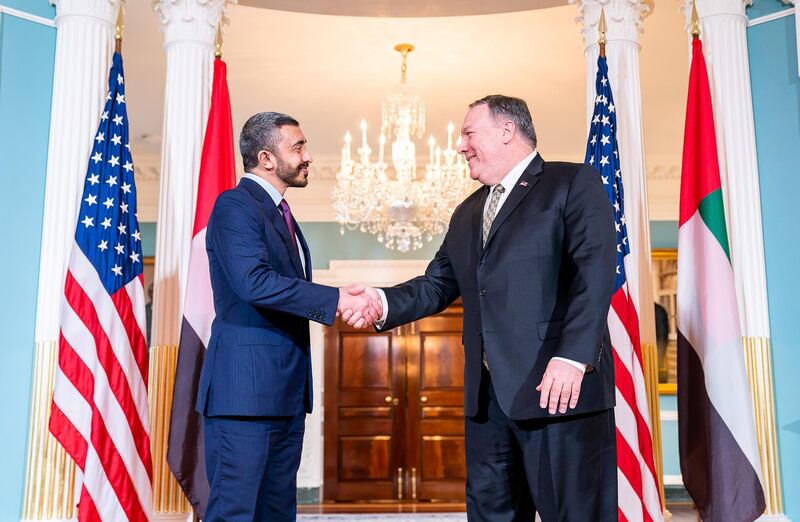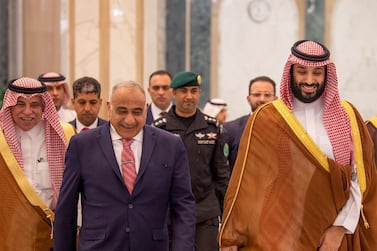US Secretary of State Mike Pompeo hosted the UAE Minister of Foreign Affairs and International Co-operation, Sheikh Abdullah bin Zayed, on Thursday and discussed the evolving situations in Yemen, Libya and Sudan.
State Department spokeswoman Morgan Ortagus said the meeting took place in Washington.
She said Mr Pompeo “thanked the Foreign Minister for the UAE's support for UN special envoy for Yemen Martin Griffiths, and agreed that parties must make good on the commitments they made in Sweden".
Mr Griffiths has made progress this week at brokering a deal that secures the withdrawal of militants from the city of Hodeidah in a matter of weeks, to be followed by talks on a larger solution.
The deal is based on the Stockholm agreement from last December.
The US statement also emphasised “the importance of stability in Libya and Sudan".
Sheikh Abdullah said "the UAE and the US are close friends and strong allies".
"Our enduring bilateral partnership is based on shared values and a common outlook for a more inclusive and peaceful future in the region," he said, according to a statement on news agency Wam.
"The UAE welcomes ongoing cooperation with the US in Yemen to confront the Iranian-backed Houthis and the terrorist group AQAP that has launched multiple attacks against US citizens and interests."
Sheikh Abdullah expressed support for Mr Griffiths and affirmed the need for a political solution to the conflict in Yemen. He called the agreement on the redeployment of forces in Hodeidah a constructive step.
Sheikh Abdullah also affirmed the UAE’s ongoing commitment to ensuring humanitarian assistance reaches the Yemeni people.
A military push by Libyan military commander Khalifa Haftar into Tripoli, which began on April 4, is raising concerns in the Trump administration over a breakout of a larger war that would hinder political progress and UN peace efforts.
In Sudan, the US and the UAE have welcomed the new leadership after the removal of Omar Al Bashir, while highlighting the need for a peaceful transition towards civilian governance.
Also discussed was “countering the Iranian regime’s destabilising activity in the region, including in Lebanon, as well as continuing to shape the Middle East Strategic Alliance”, Ms Ortagus said.
Egypt has pulled out of the Mesa process and meetings in Washington and Riyadh have not yet led to the alliance between the US, Saudi Arabia, the UAE, Bahrain, Qatar, Oman and Jordan.
Sheikh Abdullah also met US National Security Adviser John Bolton. Mr Bolton tweeted that the two discussed regional conflicts.
Great meeting today with Emirati Foreign Minister Sheikh Abdullah bin Zayed Al-Nahyan. We discussed the strength of our bilateral cooperation under the Trump Administration and continuing to work together to solve various regional conflicts. pic.twitter.com/AHqxfrqHBV
— John Bolton (@AmbJohnBolton) April 18, 2019
[ https://twitter.com/ambjohnbolton/status/1119001586808885249?s=21 ]
Sources from Mesa countries confirmed that Egypt had left the alliance process.
A US official said “Egypt plays a very important role in regional security and is a critical strategic partner for the United States,"
"The United States and all member countries want Egypt to be part of the alliance, which will have many benefits," they said.
"We continue our engagement with the government of Egypt and hope they will seize the opportunity to play a leadership role as the alliance is formed.”
Sheikh Abdullah’s visit follows one by Dr Anwar Gargash, Minister of State for Foreign Affairs, to Washington last week.







